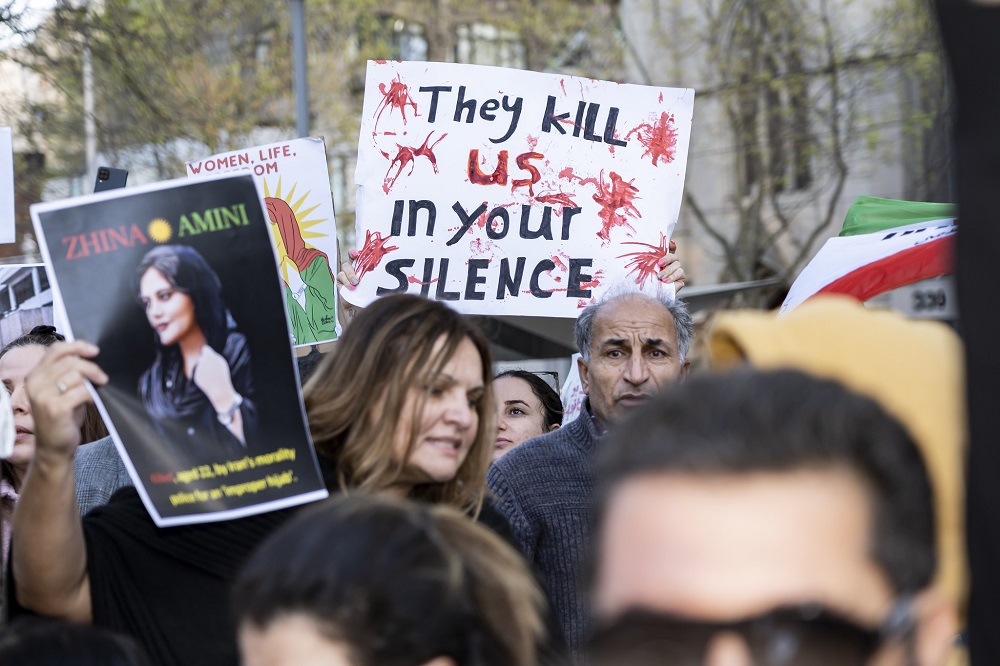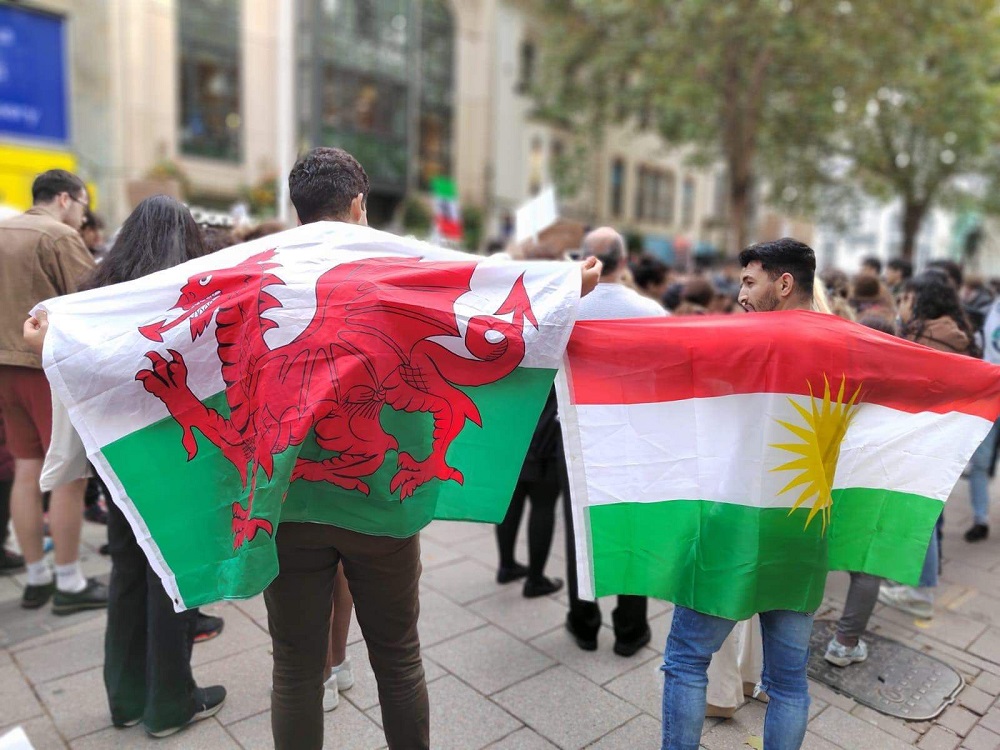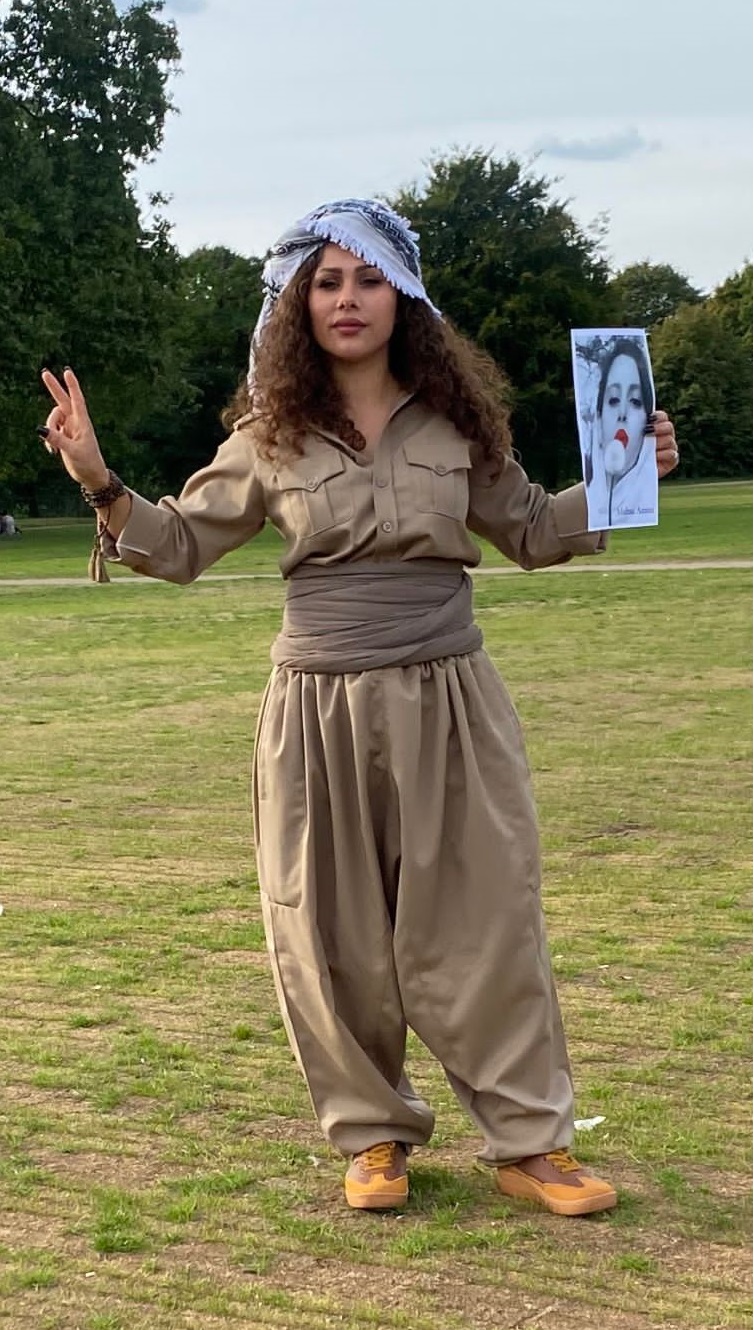‘We’re fighting for her name and our flag’: Why Welsh Kurds fear their identity is being airbrushed from Iranian protests

Luke James
Most of the world knows her as Mahsa Amini. That’s the official name of the 22-year-old woman whose death at the hands of Iran’s morality police set off unprecedented protests for women’s rights.
But to her family, friends and community she was Zhina, which means “life” in Kurdish.
Her double identity is common in Iran, where Kurdish names and those of other minorities are routinely rejected by the authorities, forcing families to choose other, usually Persian, names for use on official documents.
Zhina’s real identity is being at best overlooked and at worst airbrushed out of her own story, impairing our understanding of why she was killed, many Kurds believe.
“What I find disappointing is that the possibility, the probability, that her Kurdishness had anything to do with the fatal violence that she experienced has been just dismissed,” Dr Farangis Ghaderi of Exeter University’s Institute of Arab and Islamic Studies told Nation.Cymru.
“At the very least we can say there’s a possibility she experienced such brutality because of her ethnicity. Because we need to remember that we’ve had reports of morality police violence against women, reports of broken arms, broken legs in some cases, but never to the extent that Zhina Mahsa experienced.”
Slogan
Zhina, from Saqqez in eastern Kurdistan, which is part of Iran, was leaving a metro station with her brother during a visit to Tehran when she was arrested by the morality police for “incorrectly” wearing her headscarf. Two hours later, she was taken in an unconscious state to a hospital where she died on September 16.
Protests began outside the hospital and gained momentum a day later when hundreds attended Zhina’s funeral in her home town despite warnings from the authorities to stay away. The protest movement soon spread across Iran under the slogan “woman, life, freedom”, a reference to her Kurdish name.
According to Iran Human Rights, at least 201 people, including 23 children, have now been killed in the crackdown on the protests across Iran which have seen women and girls removing and even burning their headscarves in defiance.
The movement has created an “unprecedented” unity between Kurds and other Iranians, according to Dr Ghaderi, the former head of the Kurdistan centre for gender studies who has lived in Iran.
“From what we observe from outside Iran, Iranian people on the ground are aware of and acknowledge her Kurdish identity,” she said.
“I think it’s not accidental that Iranians at large have decided to adopt the slogan ‘woman, life, freedom’ which is a Kurdish slogan which was first chanted in her hometown and other Kurdish cities.
“But what I find disappointing and harmful is that I see commentators, experts and academics dismissing this or downplaying the ethnic element, downplaying ethnic oppression. That I find harmful to the solidarity people have created on the ground.”

‘Angry’
That has contributed to Zhina’s identity, and its potential impact on her treatment by Iran’s morality police, being largely overlooked internationally, including in Wales.
Activists and MSs took part in a solidarity protest on the steps of the Senedd in Cardiff this week and MSs have spoken out in support of the protests in the chamber and through a statement of opinion signed by almost half of members.
However, no mention of Zhina’s Kurdish ethnicity has been made by MSs, who have referred to her as Mahsa.
Representatives of the Kurdish All Wales Association (KAWA) said they were even told not to bring Kurdish flags to the Senedd. The only flags visible in photos of the demonstration are those of the flag of Iran prior to the Islamic revolution of the 1970s.
“Farsi (Persian) speaking people who have loyalty to the previous regime told the Kurdish people that they should not bring Kurdish flags. Basically, they are hijacking the protest in their favour,” a KAWA representative told Nation.Cymru.
Welsh Kurds have held two of their own protests in Cardiff over the last month.

Layla Hassanzadeh, who is from eastern Kurdistan but has been living in Cardiff since 2014, was among those taking part and told Nation.Cymru how Islamic dress code was strictly enforced even before the creation of the morality police in 2005.
“In school, outside, all the time, we have to wear a hijab,” she said. “We were scared of the police. Even at that time when there wasn’t the morality police, we still had to be careful. Particularly in school, they were very strict.”
Layla said that having to fight for Zhina’s real identity to be recognised at the same time as fighting for women’s rights and democratic reform was “painful”.
She said: “We are upset because here they want to shut our mouths to not say anything about Kurdistan. Even don’t say Zhina. It’s very painful.
“Our fight is harder because we have to fight for her name and our flag. That’s why I am angry and all night I can’t sleep, I just cry.”
‘Dehumanisation’
There are around 25-35 million Kurdish people, most of them separated between four states: Turkey, Iran, Iraq and Syria.
In Iran, Kurds make up around 10% of the population. On top of ethnic and national differences, the more secular nature of Kurdish society puts them even further at odds with the theocratic government of Iran.
Ethnic minorities, including Kurds, are more likely to be handed death sentences for religious crimes such as “enmity against God”, according to Amnesty International.
The human rights body also say ethnic discrimination is “curtailing their access to education, employment and political office.”
Far from being a distraction from the women’s rights protests taking place across Iran, insisting on Zhina’s identity being properly recognised is a crucial part of them, according to Dr Ghaderi.
“It’s important that the historic, systemic, structural discrimination against Kurds – the dehumanisation of Kurds – be acknowledged,” she said. “That’s the first step towards creating a democratic country.”
Support our Nation today
For the price of a cup of coffee a month you can help us create an independent, not-for-profit, national news service for the people of Wales, by the people of Wales.






I empathize with the Kurdish people of Wales who hear & see in the news the dictatorial Iranian government use, twist & abuse their religion to deny Iranians their human rights, but see no reporting of their plight at the hands of this regime even though in contact with family members back home who tell them of horror stories. All we & they see is the world media largely reporting on the war in Ukraine mainly because Russia is America’s enemy therefore ours. The world turns a blind eye to the stateless Kurdish people’s suffering, whose country has effectively been… Read more »
Ukraine, Palestine and Kurdistan all deserve our support